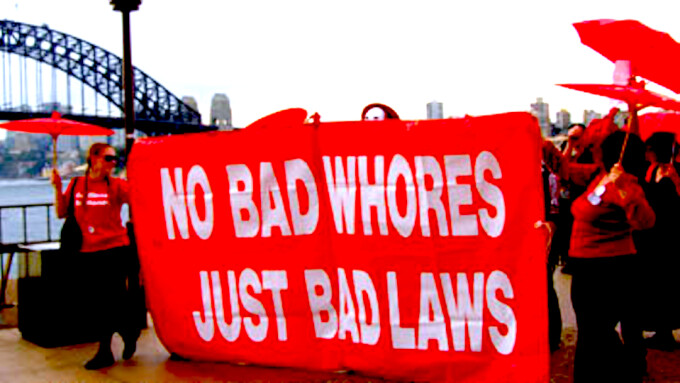AMSTERDAM — The 2020 commemoration of International Sex Workers Day (originally known as “International Whore’s Day”) sees the militant marches for sex worker rights of years past — a yearly push for life-saving visibility epitomized by brandishing red umbrellas — replaced by a sobering assessment of how COVID-19 protocols worldwide have essentially put sex workers’ right to work in the hands of uncaring government officials.
In the U.S. this is also compounded by the militarization of the public space in the past few days (curfews, ramped-up law enforcement) following protests denouncing police brutality, directly affecting the vast number of sex workers who live or work on the streets.
And with sex workers in the adult entertainment industry, this International Sex Workers Day also offers few reasons to celebrate, given that production of anything but at-home content has been halted since March, awaiting official instructions on when on-set shoots can resume.
A Case Study
Amsterdam, stereotyped in popular culture as a sex-work-friendly city (evidence about trends in Dutch politics over the last 20 years shows otherwise), provides a case-study for what 2020 looks like right now for those interested in sex workers' rights.
According to a report by Dutch News today, while other “contact work” in the Netherlands (hairdressers, manicurists, masseurs) have been allowed to return to work since May 11, legal sex workers have been told to wait until at least September 1.
While the country’s welfare system provides some relief for the out-of-work sex workers (around $1,100 a month), according to the report some are leaving the country for destinations where it is rumored escorting and other forms of sex work are being quietly tolerated.
Others, like the sex workers living or working on the streets, don’t have that option and are thus further criminalized and subject to police abuse.
“What’s devastating is to see how my community is suffering,” Yvette Luhrs, an adult performer, and cam model who is also an activist with Amsterdam’s Prostitute Information Centre, told Dutch News.
“I have good friends who can’t pay rent, friends who have been saving for a Master’s degree who now can’t attend university and friends buying groceries for other friends who can’t afford it,” Luhrs added. “People don’t know what to do.”
A Political Decision
While fitness clubs, saunas, spas, arcades and casinos were supposed to remain closed until September, these businesses successfully lobbied government officials to change the date to July 1. Sex workers, however, were not treated similarly.
A spokesperson for the Dutch Ministry of Justice told Dutch News that they “were advised to wait, although ultimately, it’s a political decision taken by the ministers.”
“There’s a stigma against sex workers, even though prostitution is legal,” Yvette Luhrs explained, in a statement that may shock foreigners who see Amsterdam as a paradise of legal protections for businesses that are considered “vices” by other cultures.
“It’s not a tolerant country when it comes to sex work, and it’s becoming less tolerant now,” Luhrs added. “I don’t know why we’re suddenly excluded from the group of contact workers.”
But sex workers are addressing the situation the same way they have confronted social stigma for millennia: self organization and mutual support.
The Red Light District’s union for “window prostitutes,” Red Light United, “last month petitioned the government to let them resume work under a strict protocol, including wearing masks and gloves, prohibiting kissing and oral sex and having sex only in positions facing away from each other,” Dutch News reported.
“Other proposals include asking customers if they’ve had COVID 19 symptoms and taking their temperatures before rendering service.”
The grim situation brought about by COVID-19 has brought to light a reality that predates the virus, even in supposedly open-minded places like Amsterdam.
“People don’t like our work and now is an opportunity to get rid of it,” sex worker and political activist Henna X told Dutch News. “Today it’s sex workers, but other groups could be next. It’s a slippery slope.”
Image: International Whore's Day Celebration, Australia, 2007.








